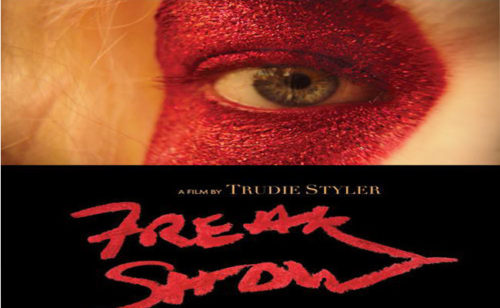The Hollywood Reporter
‘Freak Show‘ Film Review: The freak flag gets stuck at half-mast
February 14, 2017
Alex Lawther stars as a transplanted gay teen whose fabulousness doesn’t play so well in the red state South until he takes a stand by running for homecoming queen in Trudie Styler‘s feature debut.
An heir to the John Hughes teen-outsider fantasy legacy, dressed up in glitter drag with a big fat inclusiveness message, Freak Flag is your basic Mike Pence nightmare. Directed in her feature debut by actress, producer, eco-activist and rock star consort Trudie Styler, who has enlisted an impressive roster of contacts both in front of and behind the camera, this formulaic feel-good comedy about the empowerment of a bullying victim was adapted from the popular 2007 YA novel by former club kid James St. James. That it unfolds with a near-complete absence of finesse or subtlety probably won’t matter a whit to a target audience weaned on Glee.
To say the movie panders to that demographic is putting it mildly. Borrowing liberally from the playbook of films like Mean Girls and Clueless, the script by Patrick J. Clifton and Beth Rigazio, who previously teamed on the Kate Hudson horror Raising Helen, manages to be both programmatic and almost formless as it lurches from one scene to the next with halting narrative flow and poorly developed characters.
What keeps it reasonably engaging despite that is an appealing central performance from Alex Lawther (best known as the young Alan Turing in The Imitation Game), even if he shows more chutzpah than emotional range. He plays Billy Bloom, who never met a flamboyant gender-blurring outfit he didn’t love. Billy grew up in the intoxicating aura of “grace, glamor and Gucci” cultivated by his boozy mother, known as Muv (Bette Midler). But when she slinks off to rehab, he lands for senior-high semester at the stately Southern mansion of “Daddy Downer” (Larry Pine).
Toning down his look for the first day at his new school into something reminiscent of Culture Club-era Boy George, Billy introduces himself to the class with one of the script’s wittier lines: “I just moved here from Darien, Connecticut, the hometown of Chloe Sevigny.” That fails to impress, and pretty soon his father’s warning — “The nail that sticks out gets hammered down” — is proven true.
Despite attracting a devoted fan in a logorrheic girl he dubs Blah Blah Blah (AnnaSophia Robb), and receiving an unexpected overture of friendship from dreamboat football star Flip Kelly (Ian Nelson), Billy becomes an instant pariah to the cheerleaders and jocks. The spitballs and slurs that rain down on him cause him to declare “total war,” upping the outrageousness of his outfits every day. That plan reaches its zenith when Billy rocks up in zombie bride couture and gets brutally beaten, slipping into a five-day coma that might have been worse had Flip not intervened.
Staged as a violent dream ballet with help from theatrical movement wizard Steven Hoggett, the physical aggression is a chilling scene, more impactful in its condemnation of homophobia, bullying and hate crimes than much of the preachier dialogue.
When Billy returns to school, the thugs who attacked him have been expelled and the new zero-tolerance policies make him a celebrity martyr, at least for a time. The idyll is enhanced by the pleasures of Flip’s company, revealing him to be a footballer with the soul of an artist. He even gets into the dress-up spirit, playing John Travolta to Billy’s Uma Thurman in a recreation of the Pulp Fiction dance to Plastic Bertrand’s ’70s Europop classic, “Ca Plane Pour Moi.” Styler, who shows little feel for the rhythms of comedy, is rarely shy about shoving in random song cues, mostly in the neo-glamrock vein, to ratchet up the energy.
Doting housekeeper Florence (nice to see you, Celia Weston) warns Billy that his crush on Flip will end in frustration. But Billy insists he’s happy to keep it platonic. The inevitable eruption of confused feelings and perceived betrayals is clumsily handled, like most of the film’s conflicts. Ditto the pass made at Billy by his secretly gay stalker — there’s always one.
Styler and the screenwriters tend to string together episodes rather than build story blocks. Some of them are amusing, like Billy’s book-report presentation as the ghost of Zelda Fitzgerald, tracing her journey “from madcap to just plain mad.” And almost all of them are costumed with extravagant tongue-in-chic humor by Colleen Atwood and Sarah Laux. But the movie doesn’t really acquire momentum until a resurgence of hostility toward him prompts Billy to run for homecoming queen — a self-proclaimed freak on a “pro-glamor/anti-khaki” ticket.
That bold gambit is not nearly as funny as it should be because of a miscast Abigail Breslin as his cheerleader archrival, Lynette. She champions “decency vs. depravity” and rallies voters with the familiar refrain: “Let’s make America great again.” But as Trumpian mean girls go, she’s blandly obvious. Nor does the messy resurfacing of Muv yield significant rewards, with the script failing to capitalize on any poignancy mustered by Billy’s painful awakening. (Midler does Midler to diminishing returns in her limited screen time.)
The film staggers toward a predictable wrap-up (Dad’s not so bad, wouldn’t you know it?), with a pat inspirational speech about all teenagers being freaks terrified of not fitting in. That familiar message is admirable in spirit, though any freshness in the delivery here is due exclusively to Lawther’s mix of sweetness, vulnerability and defiant pride. Amplifying that attitude is a cute extended cameo from Laverne Cox as a local TV reporter covering the homecoming-queen story, who’s firmly in Billy’s corner.
Shot in glossy widescreen by Dante Spinotti, no less, the movie is surprisingly lacking in a visual stamp. It’s as if all the imagination went into Billy’s wardrobe — which ranges from Lady Gaga knockoffs through Little Mermaid-style underwater fantasies to divinely drab Parisian beatnik weeds. Freak Show premiered in Berlin’s Generation 14 Plus section for young audiences, and though the project’s heart is in the right place, the unsophisticated execution means easy-to-please teens will likely be its main audience.













I still have not seen this film and it’s 2019! I so enjoyed reading that synopsis. I missed it before. At least now I have a better idea of the plot…and I still am excited to see it soon!